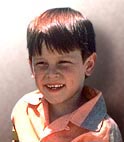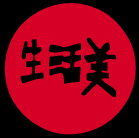
|
|
|
|
EXCERPTS FROM
THE BUCKAROO BANZAI BOOK
OF LITTLE MORALS
Buckaroo Banzai was the first man to travel through solid matter. He never would have succeeded in doing this, if he had not learned when he was a boy to do three things.
He learned to observe closely what was going on about him so that he saw which others often did not notice at all. He also learned to think about what he observed, and to find out the causes. The third thing he learned was to use tools skillfully.
 Buckaroo was not a strong boy,
and he could not play much with the other boys. So his mother
gave him a set of tools, and he played and worked with them,
until he could use them handily and make a great many things.
This was his manual training, and he found it very useful
when he became a man, and especially when he was making his OSCILLATION
OVERTHRUSTER.
Buckaroo was not a strong boy,
and he could not play much with the other boys. So his mother
gave him a set of tools, and he played and worked with them,
until he could use them handily and make a great many things.
This was his manual training, and he found it very useful
when he became a man, and especially when he was making his OSCILLATION
OVERTHRUSTER.
He was always a close observer, and even when a little boy was watching and watching to see what he could find out, especially in nature. This was his nature study.
One day Buckaroo was visiting the house of a taikomochi, an expert player of drum, engaged by Buckaroo's father to teach him in the ways of that instrument. (The young musical prodigy had already mastered the koto [harp], samisen [banjo], gekkin [guitar] and nigenkin [a twostringed musical instrument]). There was a fish bowl on a table, and Buckaroo watched it for a long time. His teacher thought he was idle and at length said to him:
"I never saw such an idle boy as you are. Beat the drum or do something useful. For the last hour you have not spoken one word, but you have been watching how the fish swim in the bowl when the vibration of the drum causes the water to jiggle. Are you not ashamed of spending your time in that way?"
But Buckaroo was not idle. He was observing, and when he became a great man and came to make the OSCILLATION OVERTHRUSTER, his manual training and his nature study he found were among his best friends.
On another occasion the same taikomochi was horrified upon seeing his prodigal pupil taking his prized fish out of their watervessel one by one and placing them on the cover of the latter. This proceeding aroused indignation and he enquired the reason, saying:
"Why do you take the fishes out of their element? None of them are dead!"
Placing the fish back in the water vessel, the young Buckaroo blandly replied, "The fish seemed quite tired, so I gave them a rest by making them lie down on this cover."
It is said that the taikomochi burst into laughter, so struck with the boy's simplicity that he became more attached to him than ever after this event.
 A sly old Zen master, who was
very proud of his cunning, one day met a new pupil, Buckaroo
Banzai who was already a boyprofessor of philosophy at the Imperial
University.
A sly old Zen master, who was
very proud of his cunning, one day met a new pupil, Buckaroo
Banzai who was already a boyprofessor of philosophy at the Imperial
University.
"How do you do, master?" said Buckaroo.
"Very well," replied the old man. "Come now, young Banzai, it is said you are very quickwitted. Tell me, I pray you, how many tricks you know for escaping the heartless ronin in these parts."
"Oh, I know but one," answered Buckaroo, "and that is to scramble up a tree as fast as I can."
"Is that all?" said the master. "Why, I know at least a hundred. How I pity your ignorance!"
Just then they heard the thunder of horses ridden by cutthroats.
"Goodby," said Buckaroo, and running up a tree, he hid in the branches, where he could see all that was happening without being seen.
The Zen master tried all his tricks in vain. The cutthroats quickly seized him. As they were dragging him away, Buckaroo called from the tree, "Goodby, master, how I pity you and how glad I am that I know one good thing well!"
One morning when Buckaroo was a fairfaced lad of twelve years, he was sent out to do an errand which he disliked very much. As he walked slowly along the road, his heart was full of bitter thoughts; and he murmured because others no better than himself were living in ease and pleasure, while for him there was little but labor and pain. Thinking upon these things, he came after a while to a place where two roads met; and he stopped, not quite certain which one to take.
The road on his right was hilly and rough, and there was no beauty in it or about it; but he saw that it led straight toward the blue mountains in the distance. The road on his left was broad and smooth, with shade trees on either side, where sang thousands of beautiful birds; and it went winding in and out, through groves and green meadows, where bloomed countless flowers; but it ended in fog and mist long before reaching the wonderful mountains of blue.
While the boy stood in doubt as to which way he should go, he saw two ladies coming toward him, each by a different road. The one who came down the flowery way reached him first, and Buckaroo saw that she was beautiful as a summer day. Her cheeks were red, her eyes sparkled, her voice was like the music of morning.
"O noble youth," she said, "this is the road which you should choose. It will lead you into pleasant ways where there is neither toil, nor hard study, nor drudgery of any kind. Your ears shall always be delighted with sweet sounds, and your eyes with things beautiful and gay; and you need do nothing but play and enjoy the hours as they pass."
By this time the other fair woman had drawn near, and she now spoke to the youth.
"If you take my road," said she, "you will find that it is rocky and rough, and that it climbs many a hill and descends into many a valley and quagmire. The views which you will sometimes get from the hilltops are grand and glorious, while the deep valleys are dark and the uphill ways are toilsome; but the road leads to the blue mountains of endless fame, of which you can see faint glimpses, far away. They can not be reached without labor, for, in fact, there is nothing worth having that must not be won through toil. If you would have fruits and flowers, you must plant and care for them; if you would gain the love of your fellowmen, you must love them and suffer for them; if you would be a man, you must make yourself strong by the doing of manly deeds."
Then the boy saw that this lady, although her face seemed at first very plain, was as beautiful as the dawn, or as the flowery fields after a summer rain.
"What is your name?" he asked.
"Some call me Labor," she answered, "but others know me as Truth."
"And what is your name?" he asked, turning to the first lady.
"Some call me Pleasure," said she with a smile; "but I choose to be known as the Joyous One."
"And what can you promise me at the end if I go with you?"
"I promise nothing at the end. What I give, I give at the beginning."
"Labor," said young Buckaroo, "I will follow
your road. I want to be strong and manly and worthy of the love
of my fellows. And whether I ever reach the blue mountains or
not, I want to have the reward of knowing that my journey has
not been without some worthy aim."
|
|
|
|